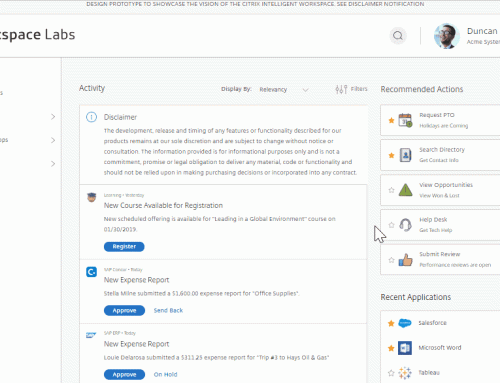The future of the workplace is about harnessing the future of individuals. As we evolve, we become increasingly dependent on mobile devices, we work faster, become less tolerant of inefficient processes and technologies. From this, we expect changes in the workplace.
By 2025, it’s estimated that 75% of the workforce across the globe will be millennials. The culture within most large organizations will be directly molded by this generation’s habits, expectations and providing an environment where individuals feel respected, independent and part of a collaborative team will be more important than ever.
Office perks and benefits were once considered a priority for us older generations. I remember the feeling of job satisfaction of negotiating a Blackberry Bold and some clunky old Lenovo laptop into my contract, however recent data shows that other facets of work matters more to the millennial working force than just “perks,” with newer generations favouring collaborative and inclusive workplaces in an open office layout where colleagues interact efficiently and frequently.
So with the communication solutions available today, how can we communicate more easily and efficiently with colleagues, leaders and external business partners and create sustainable collaborative workplaces?
Stop Relying On Email
We’re soon to reach a new frontier — a world without email. Email is strenuous. You always have to search for content, and it’s difficult to share. For too many of us, the workday is a chore. We’re constantly interrupted by emails while we’re trying to concentrate, which affects our productivity. I’m not alone on this as it has led to some companies to drastically cut back on emails with Atos, a French IT services company, launching a zero email initiative to eliminate internal email use across the organization.
Younger generations already tend to use email less, preferring instead to use mobile applications or messaging services like WhatsApp. But do these indicators apply to the future work environment? Yes and no. “Yes” because the trend for collaboration is moving toward the virtual workspace in which project members can meet and communicate anywhere, at any time. Citrix Podio, a flexible social collaboration platform, is one such tool.
Podio can be considered quasi kind of a “Facebook for companies” and are used by a diverse range of corporate departments to manage their work, store documents and hold business discussions. Project teams can plan entire projects, record progress and results, assign each other tasks and discuss outstanding issues. All participants communicate via one central platform without writing a single email.
Studies show email will not be rendered obsolete with current research by McKinsey & Company revealing that although email usage has decreased by 20 % from 2008 to 2012 it remains central to external collaboration with customers, suppliers and business partners.
Embrace New Collaboration Methods
Using email communication and social collaboration platforms properly will allow you to communicate more efficiently and more effectively. However, these methods will probably not meet all your communication needs. To chart a sustainable communication future today, companies and employees need to collaborate using additional communication tools.
For decades, email has been the dominant form of workplace communication. But with the rise of technologies powered by the cloud, workers are increasingly able to collaborate using innovative new mixtures of video, smart-screen touch, and messaging apps, the resulting work, and conversation saved automatically in the cloud, everyone able to access it using any device on their own time. Thanks to the magical unicorn that is technology, we basically follow the sun while working to meet deadlines for clients. Everyone is mobile.
Online meeting solutions and video conferencing have been proven to be effective communication tools. Online meetings can start from a social collaboration platform. The advantage: all the participants can communicate with one another both synchronously and asynchronously. This way, participants collaborate through video conferencing and screen sharing, have access to all relevant files and can document tasks and progress. Services such as GoToMeeting complement in-person meetings, reducing travel times and costs significantly. First, though, your company must integrate a robust online-meeting culture.
Doing this means creating a culture of collaboration based on respect, trust and consideration. It is up to managers to create this culture. Tools for better collaboration – such as online meetings or webinars—help to establish a collaborative culture, as they enable employees, customers, and business partners to work together across distances in real time. They can communicate face to face with each other as if everyone were in the same room.
It is important to select tools that are as easy to use as a smartphone. Think about your phone: you just pick it up, dial a number and talk. If there were various complex functions and settings, you and your business wouldn’t make calls unless they were absolutely necessary. The same principle applies to web-based communication tools.
Create A Flexible Work Environment
Another important area of company culture is the flexibility to work beyond the office. According to Deloitte, 75% of our current working generation thinks that a “work from home” or “work remotely” policy is important from a study published in 2016.
Early in my career, the offices I worked in were largely limited to the four walls of their buildings with the only time I spent out of the office was on annual leave. Everyone would be clocking into work at a desk, while the entire enterprise supported by an in-house IT system with bulky servers occupying space within a dusty old rack perched somewhere at the back of the office. But now, IT systems are increasingly being outsourced remotely to the cloud, ensuring more efficient communication while also freeing up physical office space — radically changing how and where we work. With employees able to work together on cloud-backed devices from anywhere in the world, the traditional office is changing from a realm of closed-off cubicles to an open space that stimulates collaboration and creativity — a hub where workers can meet when necessary or use video-enhanced boardrooms to stage virtual meetings with far-flung colleagues.
When it comes to putting this into practice, Our sales and project leads often work on the road, and are only required to come into the office one day a week, so it’s imperative to utilize technology such as Teba Workspace they can work and telecommute from home or on the road. They don’t have to deal with the drudgery of commuting and are able to be more productive by working without interruption increasing revenue. Plus, we have reduced our office footprint — being able to access applications, data and telecommunicate effectively has made a huge difference for us in terms of a real-estate cost perspective.
Technology is now allowing us to be on the same page no matter our location. We’re entering a new phase of collaboration where team members can use tools to speed up innovation, jumping from the boardroom to their personal devices while keeping the conversation going via video and messaging apps to finish the job, even when they’re not in the same office or time zone — this is the future of work.
New kinds of technology are going to shift work into more team-type environments where it’s easier to collaborate and track documents — it’s going to be a huge shift in our society and instead of trying to control or limit these changes, enterprises should embrace them.
Whatever the design of the physical workplace, there are fundamental concepts about the changing nature of work – and of workers – that every enterprise needs to get right.
Join to newsletter.
Curabitur ac leo nunc vestibulum.





